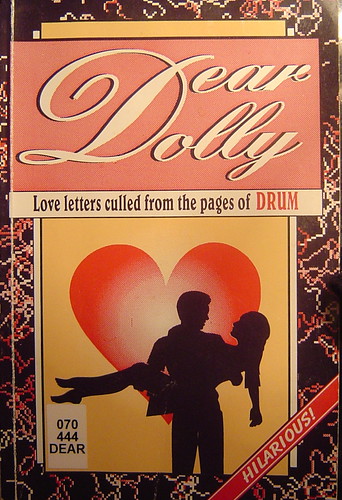Dear Dolly VI
 It's time for more from Dolly, the advice columnist for Drum magazine, but this week, I thought I'd share an excerpt about "Dolly" from a book written by one of Drum's first editors, Anthony Sampson. He published the book in 1956, after writing it on the boat he was taking back to England after leaving South Africa.
It's time for more from Dolly, the advice columnist for Drum magazine, but this week, I thought I'd share an excerpt about "Dolly" from a book written by one of Drum's first editors, Anthony Sampson. He published the book in 1956, after writing it on the boat he was taking back to England after leaving South Africa.Here's what he has to say:
We started a feature called Heartbreaks, on the pattern of European magazines, and invited readers to send their problems to "Dolly Drum." Heartbreaks became one of the most popular pages in the magazine, but the problems were baffling in their confusion and silliness. Dolly, who was a worried syndicate of men, became almost as confused as her readers. We tried all kinds of people for the job: a missionary, but he was too severe; Henry [Nxumalo, aka "Mr. Drum," the magazine's most accomplished and acclaimed investigative reporter], but he was too frivolous; myself, but I was too patronizing. Being Dolly was a job that everyone tried to escape. We ended by discussing the trickier problems around the office.
"Here's someone from Orlando who wants a second wife."
"Tell him he can't love two women at once."
"Why not? I can."
Polygamy was one of Dolly's recurring problems. Under tribal custom, a man could have as many wives as he could afford: he paid lobola, or bride-price, to each father-in-law. The systems still survives [...] but most of our readers were married by Christian rites, and their education was Christian. The conflict between the two traditions was obvious in the letters:
I am a young man in Kenya in a responsible position and earning a good salary. I am married and have two children. But my wife doesn't obey me, and I want to divorce her. Not long ago I was going to the country on business and asked her to make me some provision, but she refused. So I think I need a second wife who will live in a different bungalow but obey my instructions. How should I do it, Dolly, please?
[...]
Race was a recurring theme. Said "Helpless":
I am an African girl living in a small town in Natal. I have had a lot of African boyfriends, and I had a raw deal from all of them. Their manners are bad, and they treat me badly. They have sometimes gone out of their way to be rude to me, and think nothing of scolding me in the presence of other people. A year ago I met a coloured man. He is such a gentleman. I am completely mad about him.
Whenever I go out with him, African men make rude remarks, and this makes me feel ashamed that I am an African. They have threatened to beat me up should they see me with him again. Dolly, what can I do? I hate the men of my race, as long as I live I will never have anything to do with them. Why don't they leave me alone?
[...]
Indians, coloureds and Europeans had more money than African men, which sometimes increased, temporarily, their attraction. Asked "Bewildered" of Benoni.
I am 22 and in love with an Indian boy. He is 25 and a shopkeeper and always gives me articles from his shop free of charge, but my parents don't know about this. I have just found out that I don't love him deeply enough. Do you think if I reject him he will want his articles back?
Dolly's correspondents were all bewildered. They were uprooted from their strict tribal discipline and not yet adjusted to Western customs. The poverty of the reserves, the compound system, the instability of Africans in towns, and the wretched lack of housing had all contributed to a promiscuous, rootless existence. [...] Some teachers with their girl pupils revealed new depths of immorality, but Dolly could never be shocked.
We are two schoolgirls, aged 17 and 18 respectively. We have just discovered that we are going to be mothers, and the man responsible is a teacher at a neighbouring school. We are still scholars and do not know what to do because this man cannot marry both of us. How can we solve this?
"Please Dolly! Help Dolly My last hope, Dolly! Dolly, what can I do, where can I go?" I could almost hear these cries of bewilderment from the shanty towns of the Reef. What could Dolly do? Their lives were so unstable and disrupted that no reply from Dolly would make sense.



1 Comments:
Erik - If you're going to be a big mzungu reporter, you can keep using the word 'tribe' even when it's totally inappropriate, as it is in most South African cases. But if you want to be better than the folks at National Geographic and the Economist, you should lose it. A tribe is a rigidly defined and exclusive ethnic grouping, and in the context of southern Africa has more to do with colonial notions of identity than any reality in social groupings. Admittedly, it's in common usage now, but it's not highly accurate.
Oh, great story on the wine. I sent it out to all kinds of people.
Post a Comment
<< Home